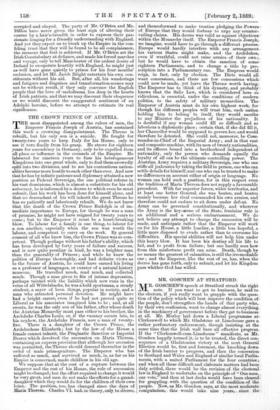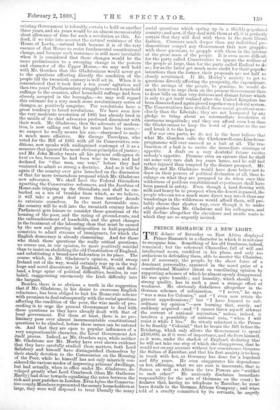MR. GOSCIIEN AT STRATFORD.
GOSCHENTS speech at Stratford struck the right ILL note. If you want to get to business, he said to the electors, if you really want to grapple with the ques- tion of the policy which will best improve the condition Of, the people, don't strengthen the hands of that party who, by their own confession, want to change almost everything in the machinery of government before they get to business at all. Mr. Morley laid down a Liberal programme at Clerkenwell to which Mr. Gladstone at Limehouse gave a rather perfunctory endorsement, though insisting_ at the same time that-the Irish wall bars- all effective progress. If the " Clerkenwell-cum-Limehouse " manifesto, as Mr. Goschen happily termed it, is to be trusted,- the direct con- sequence of a Gla,dstonian victory at the next General Election would be, first and foremost, the knocking down of the-Irish barrier to progress, and then the concession to Scotland and Wales and England of similar local Parlia- ments, with- a united Parliament for the four countries ; and when all these difficult and elaborate matters had been duly, settled,- there would be- the revision of the electoral law in England to undertake on the principle of "One man, one vote," and then at last decks would have been cleared: for grappling with the question of the condition of the people. Now, as Mr. Gfoschen says, at the most moderate computation, this would take nine years, since the existing Government is tolerably certain to hold on another three years, and six years would be an almost inconceivably short allowance of time for such a revolution as this. In- deed, if we take into account the natural resistance of the 'House of Lords,—natural both because it is of the very essence of that House to resist fundamental constitutional change, and because such resistance is still more inevitable when it is considered that these changes would be the mere preliminaries to a sweeping change in the powers and character of the Upper House,—we may well hold with Mr. Goschen that the Gladstonians would never get to the questions affecting directly the condition of the people till the twentieth century is well set in. 'When it is remembered that it took first a ten years' agitation and then two years' Parliamentary struggle to extend household suffrage to the counties, after household suffrage had been already accepted in the boroughs,—we may well regard this estimate for a very much more revolutionary series of changes, as positively sanguine. For revolutions have a great tendency to breed revolutions. We have seen how the very moderate revolution of 1885 has already bred in the minds of its chief advocates profound discontent with their work. Mr. Gladstone, then the advocate of modera- tion, is now calling out that he must have his razor,— we suspect he really means his axe,—sharpened to make it much more effective. Sir George Trevelyan, who voted for the Bill of 1885 with all its Conservative con- ditions, now speaks with undisguised contempt of it as a measure that ignored the most obvious principles of justice ; and. Mr. John Morley treats all his present colleagues de haut en bag, because he had been wise in time, and had declared for "One man, one vote," before they had ventured to admit so strong a doctrine. And so it will be again if the country ever gets launched on the discussion of that far more tremendous proposal which Mr. Gladstone now advocates. We shall have the Federal Girondists upsetting the Conservative reformers, and the Jacobins of Home-rule tripping up the Girondists, and. shall be em- barked on a sea of troubles from which, as we believe, it will take a great deal more than another decade to extricate ourselves. In the most favourable case, the country will be well into the twentieth century before Parliament gets leisure to consider these questions of the housing of the poor, and the rating of ground-rents, and the enfranchisement of leaseholds, and the great changes in the treatment of the labouring class that must be caused by the new and growing indisposition in half-populated countries to admit streams of immigrants, for which the English democracy is already clamouring. And for those who think these questions the really critical questions, no course can, in our opinion, be more positively suicidal than to insist on abolishing the old Constitution of England, and substituting a brand-new federation in its place. The course which, in Mr. Gladstone's opinion, would sweep Ireland out of the way, would certainly rear up in the way huge and novel discontents in England, Wales, and Scot- land, a huge spine of political difficulties, besides, in our belief, exaggerating enormously the Irish difficulty into the bargain.
Besides, there is so obvious a truth in the suggestion tkat if Mr. Gladstone, in his desire to overcome English reluctance, has been obliged to bait his Home-rule scheme with promises to deal subsequently with the social questions affecting the condition of the poor, the wise mode of pro- ceeding is to urge the present Government to deaf with these questions as they have already dealt with that of local government. For them at least, there is no pre- liminary pass over almost insurmountable constitutional .questions to be climbed, before these issues can be entered on. And that they are open to popular influences of a very unquestionable character, the Local Government Act itself proves. Indeed, .as Mr. Goschen says, while neither Mr. Gladstone nor Mr. ,Morley have ever shown evidence that they have carefully studied these matters, both Lord Salisbury and himself have distinguished themselves by their steady devotion ,to the Commission on the Housing of the Poor, while he himself has not only minutely con- sidered the various modes of improving artisans' dwellings, but had actually, when in office under. Mr. Gladstone, de- veloped greatly what Lord Cranbrook (then Mr. Gathorne Hardy) had done towards equalising the rates between the rich and poor parishes in. London. Even before the Couserva- tive county Members represented the county householders at large, they were well disposed to treat liberally the many social questions which spring up in a thickly-populated country; and now, if they deal with them at all, it is perfectly certain that they will deal with them in the most liberal fashion. Currents much deeper than any individual pre- dispositions compel any Government that now grapples with these questions, to grapple with them in the interest of the great mass of the people. It is even more difficult for the party called Conservative to ignore the welfare of the people at large, than for the party called Radical to do so ; for as the latter get much more credit for their popukr intentions than the former, their proposals ara not half so closely scrutinised. If Mr. Morley's anxiety to get to questions directly affecting the prosperity, the expenditure, or the savings of the people, be genuine, he would do much better to urge them on the present Government than to draw bills on that very dubious and distant future which is only to get itself realised after the United Kingdom has been dissected and again pieced together on a federal system. The Conservatives have studied these social questions more closely than the Liberals ; they are not hampered by any pledge to bring about an intermediate revolution of enormous magnitude ; and they can afford even less than the Gladstonians to keep the word of promise to the ear and break it to the hope.
For our own parts, we do not in the least believe that what Mr. Goschen calls the Clerkenwell-cum-Limehouse programme will ever succeed as a bait at all. The true function of a bait is to excite the immediate stirrings of appetite. A draft on a very doubtful future excites nobody's appetite. Promise even an epicure that he shall eat some very rare dish ten years hence, and he will feel rather injured than tempted by the distant prospect. Mr. Morley and Mr. Gladstone would have done better not to draw on their powers of political divination at all, than to enlarge on what they are prepared to do when once this wilderness of perilous constitutional experiment shall have been passed in safety. Even though a land flowing with milk and honey be in prospect when the desert is passed, the people who can see a much more direct way into it than any wanderings in the wilderness would afford them, will pro- bably choose that shorter way, even though it be under other guides than Mr. Gladstone and his colleagues, and will decline altogether the circuitous and sterile route to which they are so urgently invited.



































 Previous page
Previous page